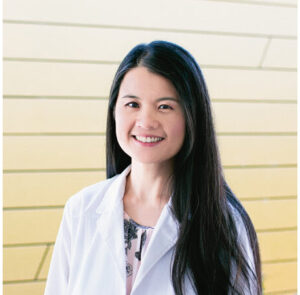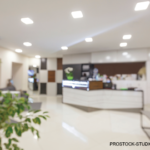 Early in her career, Tien-I Karleen Su, MD, FACR, Amicus Arthritis & Osteoporosis Center, Whittier, Calif., saw firsthand some of the challenges of working as a rheumatologist for a large healthcare system, leading her to explore other options. Now, she is part of a private practice and founder of the Rheumatology Private Practice Alliance (RPPA). She’s also helping support other private practice physicians as chair of the ACR’s new Community Practice Council (CPC). Recently, she spoke with The Rheumatologist about her work.
Early in her career, Tien-I Karleen Su, MD, FACR, Amicus Arthritis & Osteoporosis Center, Whittier, Calif., saw firsthand some of the challenges of working as a rheumatologist for a large healthcare system, leading her to explore other options. Now, she is part of a private practice and founder of the Rheumatology Private Practice Alliance (RPPA). She’s also helping support other private practice physicians as chair of the ACR’s new Community Practice Council (CPC). Recently, she spoke with The Rheumatologist about her work.
The Rheumatologist (TR): Could you tell us a little about your background getting started in private practice?
Dr. Su: I completed my fellowship in 2010 and started a part-time employee position at a large medical group where one of the attending physicians from my fellowship also worked. My co-fellow and I worked there for about five years, gaining firsthand experience of the bureaucracy in a large medical group. We faced challenges, such as issues with billing, collections, no-shows and high overhead. We also realized the group was geared more toward primary care [than rheumatology].
In 2014, the group adopted a new EHR [electronic healthcare record] system that made it burdensome for us to finish our charts. [The EHR] contributed to my decision to leave [the practice] in 2015. I initially thought about taking a sabbatical to travel, but three of us in the medical group decided to start a private practice on our own.
We faced many challenges early on because we lacked knowledge on running a practice efficiently. [We were] advised that having an office manager would make things easier, but we encountered many difficulties—going through five office managers in eight years; I found out human resources (HR) was the most challenging part of the business.
By the third or fourth year with the new practice, I was thinking that other rheumatologists must be dealing with similar challenges. In 2018, I connected on Facebook with the founder of a woman’s rheumatology group and formed a Facebook group dedicated to rheumatology private practice, which became the RPPA. Only rheumatologists or rheumatology fellows are eligible to join this group, so it provided a safe platform for us to share information and ask questions. There are so many people out there eager to connect that the group has organically grown to more than 1,000 rheumatologists.

Dr. Su
The experience of connecting so many rheumatologists to support one another in the RPPA had such a positive impact on my mission. I wanted to find more ways to help private practice rheumatologists. When I learned about the ACR’s Community Practice Council (CPC) seeking volunteers in early 2023, I applied and became the chair of CPC.
TR: How many doctors are in your practice?
Dr. Su: We have a total of three rheumatologists and two physician assistants. The second physician assistant joined us in January.
TR: What do you think about working in a private practice vs. other settings, such as academia or large healthcare systems?
Dr. Su: I think everyone has different interests and goals. In academia, individuals thrive on academic interactions and collaborative learning. There seems to be a misconception that physicians in private practice do not get to teach or conduct research. In our clinic, we have residents who do their clinical rotations with us. Many of our staff are pre-med or pre-PA, and we provide them with mentoring. Our patients have had access to 40-plus clinical trials in the past 15 years. I share cases with my colleagues in my practice as well as private practice rheumatologists in RPPA, so I never feel like I lack opportunities to learn from others.
Private practice suits me very well because I really value autonomy and the ability to pivot quickly when needed so we can deliver care more efficiently. I recall when the pandemic first hit, our clinic implemented telehealth within a week, but some larger organizations took months.
TR: What do you think the ACR can do to help HR in the private practice setting? What are some current and future plans for the CPC?
Dr. Su: The CPC and the Committee on Rheumatologic Care (CORC) are working together to update the ACR’s previous private practice manual, with a focus on sharing collective wisdom to address various challenges in private practice, including those involving HR.
In the CPC, we have three subcommittees with the following aims: 1) raise awareness about private practice rheumatology, 2) provide resources for private practice rheumatologists and 3) analyze data to better understand the demographics and clinical reach of private practice rheumatologists, as well as their impact on rheumatology workforce issues.
Since becoming a part of the CPC, I have had opportunities to learn more about what the ACR has accomplished for rheumatologists in private practice. I think it would be important to help rheumatologists in private practice learn more about the ACR’s efforts and interest in promoting private practice. At the same time, the CPC would like to amplify the voice of private practice rheumatologists and help the ACR gain a better understanding of our needs in private practice.
TR: How do you balance out the stress of running a practice? What do you do in your spare time?
Dr. Su: I enjoy doing creative things, like photography and making collages in my journal. If I just want to relax and decompress, watching K-dramas [Korean dramas] always does the trick!
Vanessa Caceres is a medical writer in Bradenton, Fla.


